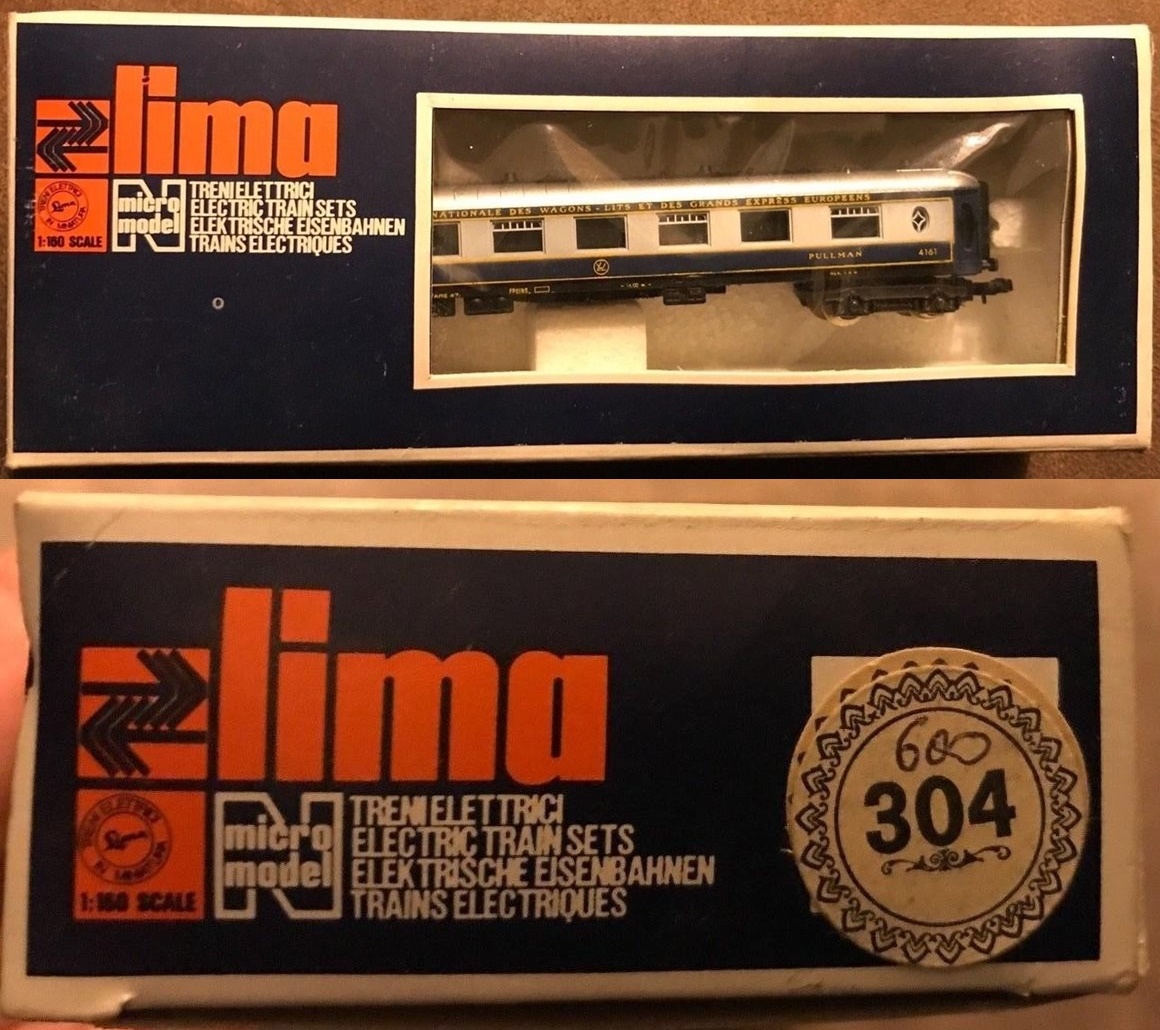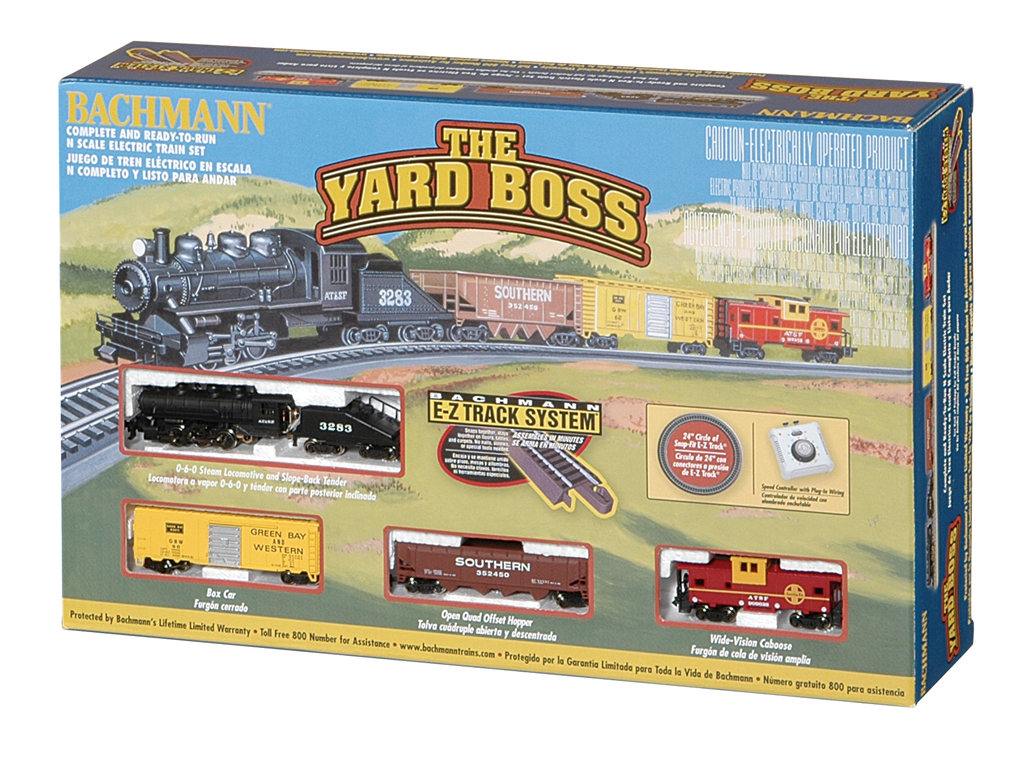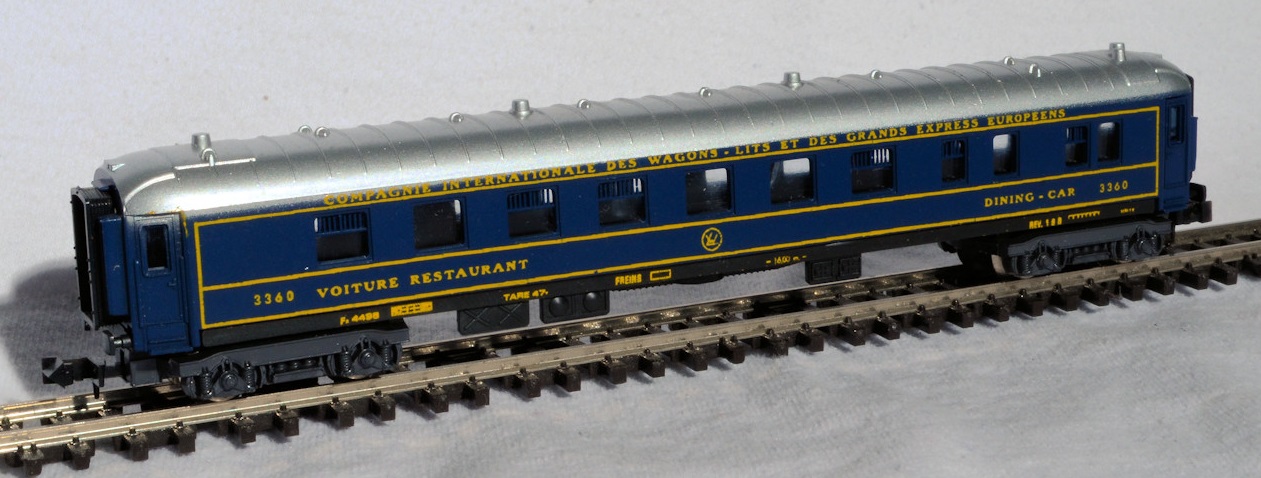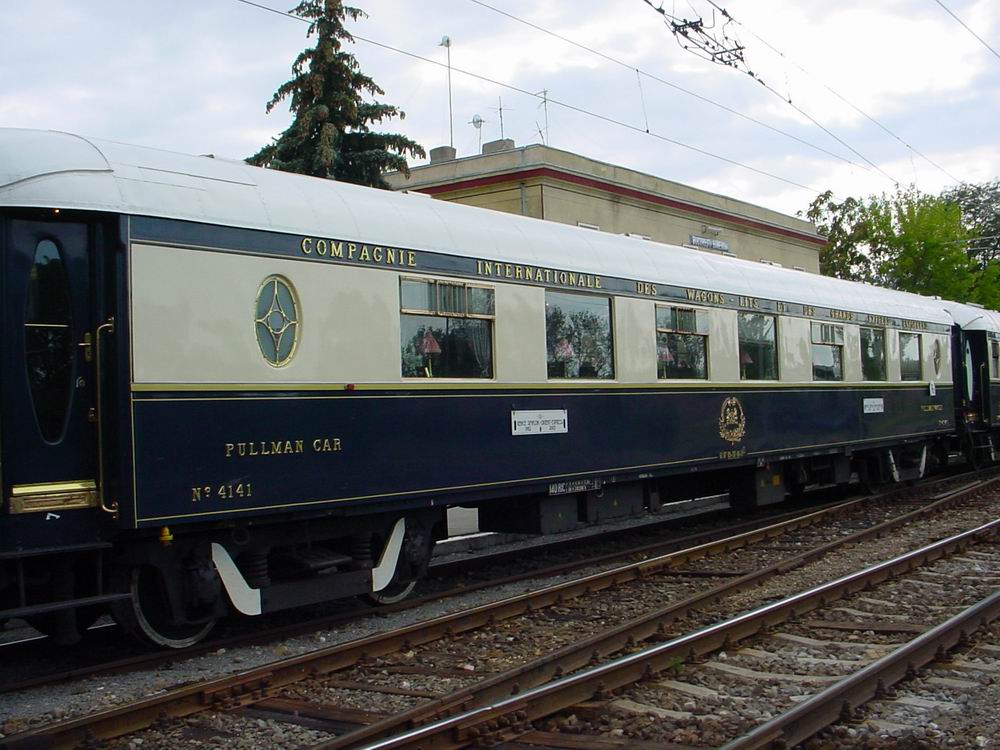Model Information: Introduced in 1968. Available up until the early 1980's.
Like most of Lima passenger cars, this one of length 138 mm is too short; it should be 146 mm long to be prototypically correct at scale N (1/160).
Like most of Lima passenger cars, this one of length 138 mm is too short; it should be 146 mm long to be prototypically correct at scale N (1/160).
Prototype History: The CIWL (Compagnie Internationale des Wagons-Lits) Pullman cars are luxury lounge and restaurant cars built in the 1920's by a variety of manufacturers. They have been in service until the early 1970's.
A total of 211 cars were built in 4 series (1st class, otherwise mentioned):
Type « Sud-Express »
- 10 lounge cars (n° 2737 to 2748)
- 3 lounge cars w. kitchen (n° 2839 to 2841)
Type « Flèche d'Or » (Paris-London)
- 15 lounge cars (24 seats) w. kitchen n° 4001 to 4015
- 15 lounge cars (32 seats) n° 4016 to 4030
- 15 other cars (n° 4051 to 4080 w. or w/o kitchen)
- 30 additional cars (n° 4031 to 4050, n° 4081 to 4090)
Type « Étoile du Nord » (Paris - Amsterdam)
- 20 coach cars (38 seats) w. kitchen (n° 4091 à 4110) - 2nd Cl.
- 20 coach cars (51 seats) (n° 4111 à 4130) - 2nd Cl.
Type « Côte d'Azur » (Paris - Vintimille « Train bleu »)
- 34 cars n° 4131 to 4164, of the following 2 types, the most luxurious of the series:
++ lounge cars (20 seats) w. kitchen
++ lounge cars (28 seats)
From Wikipedia (in French)
Full roster of CIWL Pullman cars on this page (in French)
A total of 211 cars were built in 4 series (1st class, otherwise mentioned):
Type « Sud-Express »
- 10 lounge cars (n° 2737 to 2748)
- 3 lounge cars w. kitchen (n° 2839 to 2841)
Type « Flèche d'Or » (Paris-London)
- 15 lounge cars (24 seats) w. kitchen n° 4001 to 4015
- 15 lounge cars (32 seats) n° 4016 to 4030
- 15 other cars (n° 4051 to 4080 w. or w/o kitchen)
- 30 additional cars (n° 4031 to 4050, n° 4081 to 4090)
Type « Étoile du Nord » (Paris - Amsterdam)
- 20 coach cars (38 seats) w. kitchen (n° 4091 à 4110) - 2nd Cl.
- 20 coach cars (51 seats) (n° 4111 à 4130) - 2nd Cl.
Type « Côte d'Azur » (Paris - Vintimille « Train bleu »)
- 34 cars n° 4131 to 4164, of the following 2 types, the most luxurious of the series:
++ lounge cars (20 seats) w. kitchen
++ lounge cars (28 seats)
From Wikipedia (in French)
Full roster of CIWL Pullman cars on this page (in French)
Road Name History: 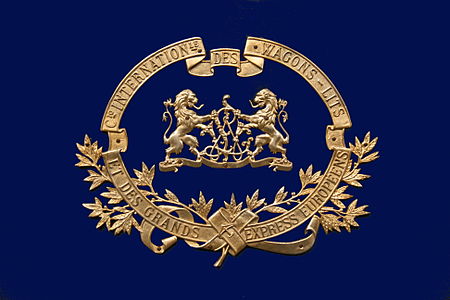 Compagnie Internationale des Wagons-Lits (English: International Sleeping-Car Company), also CIWL, Compagnie des Wagons-Lits, or just Wagons-Lits, is an international hotel and travel logistics company, particularly known for its on-train catering and sleeping car services, as well as being the historical operator of the Orient Express.
Compagnie Internationale des Wagons-Lits (English: International Sleeping-Car Company), also CIWL, Compagnie des Wagons-Lits, or just Wagons-Lits, is an international hotel and travel logistics company, particularly known for its on-train catering and sleeping car services, as well as being the historical operator of the Orient Express.
The Orient Express was a showcase of luxury and comfort at a time when travelling was still rough and dangerous. CIWL soon developed a dense network of luxury trains all over Europe, whose names are still remembered today and associated to the art of luxury travel. Such as the Blue Train ("Train Bleu"), the Golden Arrow ("Flèche d'Or"), North Express ("Étoile du Nord") and many more. CIWL became the first and most important modern multinational dedicated to transport, travel agency, hospitality with activities spreading from Europe to Asia and Africa.
Now part of the French Newrest group, Compagnie Internationale des Wagons-Lits (et des grands express européens) (English: The International Sleeping-Car (and European Great Expresses) Company) was founded by Georges Nagelmackers during 1872, in Belgium. CIWL quickly established itself as the premier provider and operator of European railway sleepers and dining cars during the late 19th and the 20th centuries.
The holding company, CIWLT, is a fully owned subsidiary of the Accor Group, the historical brands were transferred to Wagons-Lits Diffusion in 1996.
From Wikipedia

The Orient Express was a showcase of luxury and comfort at a time when travelling was still rough and dangerous. CIWL soon developed a dense network of luxury trains all over Europe, whose names are still remembered today and associated to the art of luxury travel. Such as the Blue Train ("Train Bleu"), the Golden Arrow ("Flèche d'Or"), North Express ("Étoile du Nord") and many more. CIWL became the first and most important modern multinational dedicated to transport, travel agency, hospitality with activities spreading from Europe to Asia and Africa.
Now part of the French Newrest group, Compagnie Internationale des Wagons-Lits (et des grands express européens) (English: The International Sleeping-Car (and European Great Expresses) Company) was founded by Georges Nagelmackers during 1872, in Belgium. CIWL quickly established itself as the premier provider and operator of European railway sleepers and dining cars during the late 19th and the 20th centuries.
The holding company, CIWLT, is a fully owned subsidiary of the Accor Group, the historical brands were transferred to Wagons-Lits Diffusion in 1996.
From Wikipedia
Brand/Importer Information: Lima N scale European models were numbered with 3 digits until 1978. They were renumbered after 1978 by adding "320" before the previous number. e.g. "306" became "320306".
Manufacturer Information:  Lima S.p.A (Lima Models) was a brand of railway models made in Vicenza, Italy, for almost 50 years, from the early 1950s until the company ceased trading in 2004. Lima was a popular, affordable brand of 00 gauge and N gauge model railway material in the UK, more detailed H0 and N gauge models in France, Germany, Italy, Switzerland, and the United States as well as South Africa, Scandinavia and Australia. Lima also produced a small range of 0 gauge models. Lima partnered with various distributors and manufacturers, selling under brands such as A.H.M., Model Power, Minitrain and PMI (Precision Models of Italy). Market pressures from superior Far Eastern produce in the mid-1990s led to Lima merging with Rivarossi, Arnold, and Jouef. Ultimately, these consolidations failed and operations ceased in 2004.
Lima S.p.A (Lima Models) was a brand of railway models made in Vicenza, Italy, for almost 50 years, from the early 1950s until the company ceased trading in 2004. Lima was a popular, affordable brand of 00 gauge and N gauge model railway material in the UK, more detailed H0 and N gauge models in France, Germany, Italy, Switzerland, and the United States as well as South Africa, Scandinavia and Australia. Lima also produced a small range of 0 gauge models. Lima partnered with various distributors and manufacturers, selling under brands such as A.H.M., Model Power, Minitrain and PMI (Precision Models of Italy). Market pressures from superior Far Eastern produce in the mid-1990s led to Lima merging with Rivarossi, Arnold, and Jouef. Ultimately, these consolidations failed and operations ceased in 2004.
Hornby Railways offered €8 million to acquire Lima's assets (including tooling, inventory, and the various brand names) in March of the same year, the Italian bankruptcy court of Brescia (town near Milan, last headquarters of Lima) approving the offer later that year. In December 2004, Hornby Railways formally announced the acquisition along with the Rivarossi (H0 North American and Italian prototypes), Arnold (N scale European prototypes), Jouef (H0 scale French prototypes), and Pocher (die-cast metal automobile kits) ranges. As of mid-2006, a range of these products has been made available under the Hornby International brand, refitted with NEM couplings and sprung buffers and sockets for DCC (Digital Command Control) decoders.
From Wikipedia

Hornby Railways offered €8 million to acquire Lima's assets (including tooling, inventory, and the various brand names) in March of the same year, the Italian bankruptcy court of Brescia (town near Milan, last headquarters of Lima) approving the offer later that year. In December 2004, Hornby Railways formally announced the acquisition along with the Rivarossi (H0 North American and Italian prototypes), Arnold (N scale European prototypes), Jouef (H0 scale French prototypes), and Pocher (die-cast metal automobile kits) ranges. As of mid-2006, a range of these products has been made available under the Hornby International brand, refitted with NEM couplings and sprung buffers and sockets for DCC (Digital Command Control) decoders.
From Wikipedia
Item created by: Alain LM on 2020-02-09 06:34:44. Last edited by Alain LM on 2020-11-01 06:44:27
If you see errors or missing data in this entry, please feel free to log in and edit it. Anyone with a Gmail account can log in instantly.
If you see errors or missing data in this entry, please feel free to log in and edit it. Anyone with a Gmail account can log in instantly.



